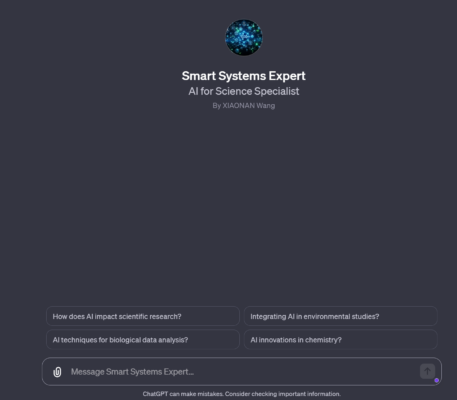The intersection of chemistry and artificial intelligence (AI) is a fascinating area that attracts a lot of attention in both research and industry. We talked to people working in the field about the potential of AI to revolutionize chemical research, but also about concerns, (current) limitations, and ethical implications for chemical applications. We also asked for ideas to try or experiment with, as well as useful articles and videos for beginners and advanced users.
Professor Xiaonan Wang, Tsinghua University, Beijing, China, works on the development of intelligent computational methods including multi-scale modelling, optimization, data analytics and machine learning for applications in advanced materials, energy, environmental and manufacturing systems to support smart and sustainable development.
What fascinates you about AI?
The rapid development of AI, propelled by vast amounts of data and significant advancements in computing power, is revolutionizing scientific research in various ways, significantly accelerating the pace of discovery. AI is not just a tool for research but a transformative force that is reshaping how we understand and interact with the world. It is integrated into the workflow and opens new frontiers in our quest for knowledge.
Is there anything we should fear?
Nothing to fear at the moment, but aligning human knowledge and ethics with AI, especially as we move towards more advanced and potentially superintelligent AI systems, is critical for preventing any misuse. The carbon footprint associated with training large-scale AI models could be a potential concern, particularly as these models become increasingly complex and require more computational power.
Do you have something for our readers to try out or experiment with?
It is fun to build an “app” based on the latest ChatGPT in two minutes and configure it with your own domain knowledge. ChatGPT, provided by OpenAI, offers APIs [Application Programming Interfaces; enable communication between two or more computer programs]. This has opened up a world of possibilities for integrating advanced language models into various applications with minimal coding effort.
An example is the Smart Systems Expert I created to simply integrate some domain knowledge and user preference within the ChatGPT engine, so that anyone can communicate with it and understand a new domain in an efficient way.

Can you recommend a good article for beginners and one you enjoyed recently?
A recently published Nature article contains a holistic view:
- Scientific discovery in the age of artificial intelligence,
H. Wang, T. Fu, Y. Du, et al.
Nature 2023, 620, 47–60.
https://doi.org/10.1038/s41586-023-06221-2
The advances in artificial intelligence over the past decade are examined, with a discussion on how artificial intelligence systems can aid the scientific process and the central issues that remain despite advances.
Scaling deep learning for materials discovery is a promising approach that combines advanced AI techniques with autonomous materials laboratory to enable accelerated discovery and manufacturing:
- Scaling deep learning for materials discovery,
A. Merchant, S. Batzner, S. S. Schoenholz, et al.
Nature 2023.
https://doi.org/10.1038/s41586-023-06735-9
A protocol using large-scale training of graph networks enables the high-throughput discovery of novel stable structures and led to the identification of 2.2 million crystal structures, of which 381,000 are newly discovered, stable materials.
and
- An autonomous laboratory for the accelerated synthesis of novel materials,
N. J. Szymanski, B. Rendy, Y. Fei, et al.
Nature 2023.
https://doi.org/10.1038/s41586-023-06734-w
An autonomous laboratory, the A-Lab, is presented that combines computations, literature data, machine learning, and active learning, which discovered and synthesized 41 novel compounds from a set of 58 targets after 17 days of operation.
Is there anything else you would like to share with readers of ChemistryViews?
The world is evolving so fast that we need to use advanced technologies like AI for good. We welcome you to visit us in China to explore the latest advancements in AI and science.
Thank you very much for the insights.
back to overview “Opinions on AI & Chemistry”



